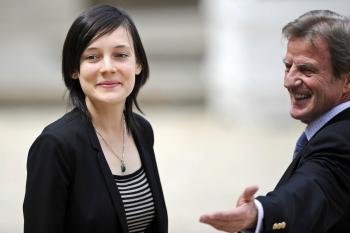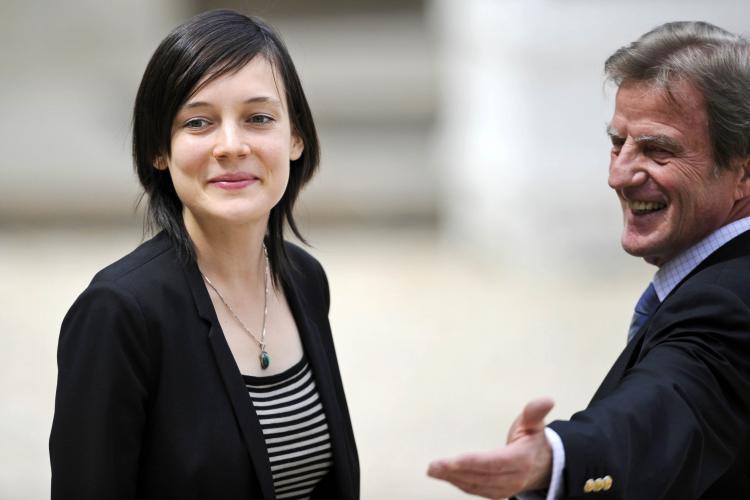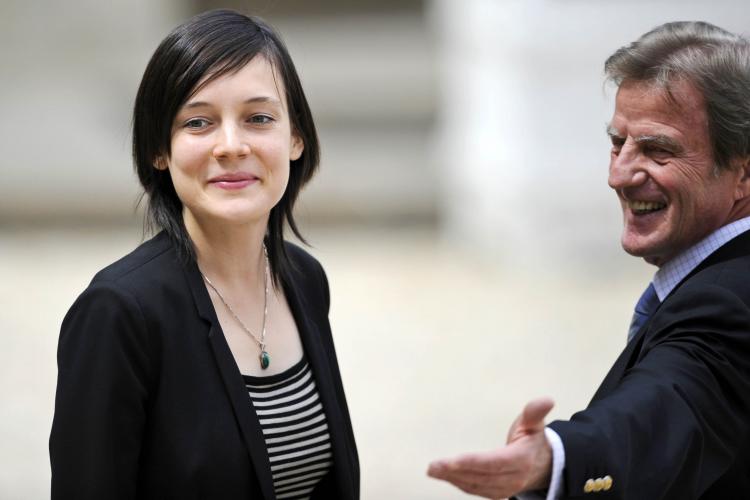PARIS—After one month in a Tehran prison and 9 months as a refugee in the French Embassy in Iran, 24-year-old political student Clotilde Reiss was back home in France on May 16, welcomed by a lunch at Elysee Palace with President Nicolas Sarkozy.
One day later, two rumors were widely debated in French media—first, did France offer compensation to Iran for the release of Reiss? Secondly, was Reiss really a simple student, or a trained French agent?
“No Bargain” Says Foreign Affairs Minister
French Foreign Affairs Minister Bernard Kouchner denied offering any compensation to the Iranian regime for Clotilde Reiss’s release. Reiss, who had been condemned to 10 years in prison for spying and for subverting state power, had the sentence commuted to a payment of US$280,000 and was allowed to leave the country after the sum had been paid on May 16.
Coincidently however, French Interior Minister Brice Hortefeux signed on Monday 17 an expulsion decree for Ali Vakili Rad, an Iranian jailed in France since 1994 for assassinating Chapour Bakhtiar, prime minister of the Shah of Iran, in 1991.
Le Monde newspaper indicates that Rad could have been freed in 2009 since he had spent 18 years in jail. “French executive power refused to sign the decree as long as Clotilde Reiss was detained in Iran,” Le Monde reported.
In December 2009, however, Le Nouvel Obs quoted Kouchner as saying that Iranian President Mahmoud Ahmadinejad “wants us to exchange her [Clotilde Reiss] for Ali Vakili Rad. ... No way. Even if we were willing to do so we couldn’t.”
The JDD newspaper additionally points at the coincidental case of Majid Kakavand, an Iranian engineer sent back to Iran last week when the United States had requested he be extradited to the United States.
Student or Spy?
“She worked for France and was collecting information on [Iranian] internal affairs and on nuclear proliferation. She is referenced in DGSE [General Direction of External Security, French intelligence in foreign countries]” claimed Pierre Siramy, a former executive at DGSE, on LCI TV. According to Siramy, Iranian intelligence discovered her mission by analyzing her e-mails.
According to some reports, that was why she was arrested at the Tehran airport on July 1, 2009, as she was trying to fly back to France.
Parisian officials strongly denied the claim on May 17, and said that Reiss was only a lecturer at Ispahan University, where she had taught for 10 months—Ispahan, that is the very city where the major Iranian nuclear enrichment plant is located.
First, a DGSE executive said to Europe 1 radio that Reiss was not an agency officer, not even an “honorary correspondent”—a nonprofessional informant used on a case-by-case basis.
Quoted by Le Point newspaper, the spokesperson for the French Foreign Ministry posed a strict denial to Siramy’s allegations. “We formally deny allegations claiming that Clotilde Reiss would have collected information in Iran for the French government [. …] These allegations are not only nonsense, they are also irresponsible. After the hardships she has gone through, Ms. Reiss deserves quietness with her relatives.”
French opposition did not elaborate on the subject, but strongly urged the government to be transparent on the negotiations made with Iran. On France Info radio, Socialist Party spokeperson Benoît Hamon said that the government “should explain, say things clearly rather than deny evidence and the choices it made. It is always better to say the truth.”
One day later, two rumors were widely debated in French media—first, did France offer compensation to Iran for the release of Reiss? Secondly, was Reiss really a simple student, or a trained French agent?
“No Bargain” Says Foreign Affairs Minister
French Foreign Affairs Minister Bernard Kouchner denied offering any compensation to the Iranian regime for Clotilde Reiss’s release. Reiss, who had been condemned to 10 years in prison for spying and for subverting state power, had the sentence commuted to a payment of US$280,000 and was allowed to leave the country after the sum had been paid on May 16.
Coincidently however, French Interior Minister Brice Hortefeux signed on Monday 17 an expulsion decree for Ali Vakili Rad, an Iranian jailed in France since 1994 for assassinating Chapour Bakhtiar, prime minister of the Shah of Iran, in 1991.
Le Monde newspaper indicates that Rad could have been freed in 2009 since he had spent 18 years in jail. “French executive power refused to sign the decree as long as Clotilde Reiss was detained in Iran,” Le Monde reported.
In December 2009, however, Le Nouvel Obs quoted Kouchner as saying that Iranian President Mahmoud Ahmadinejad “wants us to exchange her [Clotilde Reiss] for Ali Vakili Rad. ... No way. Even if we were willing to do so we couldn’t.”
The JDD newspaper additionally points at the coincidental case of Majid Kakavand, an Iranian engineer sent back to Iran last week when the United States had requested he be extradited to the United States.
Student or Spy?
“She worked for France and was collecting information on [Iranian] internal affairs and on nuclear proliferation. She is referenced in DGSE [General Direction of External Security, French intelligence in foreign countries]” claimed Pierre Siramy, a former executive at DGSE, on LCI TV. According to Siramy, Iranian intelligence discovered her mission by analyzing her e-mails.
According to some reports, that was why she was arrested at the Tehran airport on July 1, 2009, as she was trying to fly back to France.
Parisian officials strongly denied the claim on May 17, and said that Reiss was only a lecturer at Ispahan University, where she had taught for 10 months—Ispahan, that is the very city where the major Iranian nuclear enrichment plant is located.
First, a DGSE executive said to Europe 1 radio that Reiss was not an agency officer, not even an “honorary correspondent”—a nonprofessional informant used on a case-by-case basis.
Quoted by Le Point newspaper, the spokesperson for the French Foreign Ministry posed a strict denial to Siramy’s allegations. “We formally deny allegations claiming that Clotilde Reiss would have collected information in Iran for the French government [. …] These allegations are not only nonsense, they are also irresponsible. After the hardships she has gone through, Ms. Reiss deserves quietness with her relatives.”
French opposition did not elaborate on the subject, but strongly urged the government to be transparent on the negotiations made with Iran. On France Info radio, Socialist Party spokeperson Benoît Hamon said that the government “should explain, say things clearly rather than deny evidence and the choices it made. It is always better to say the truth.”







